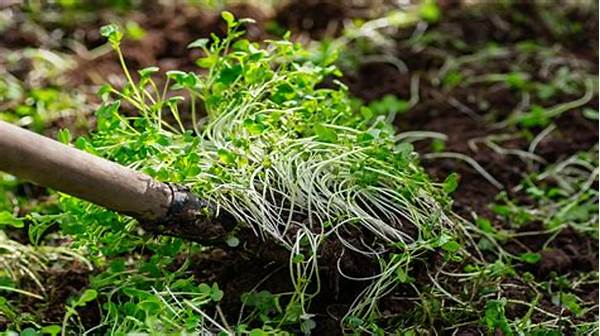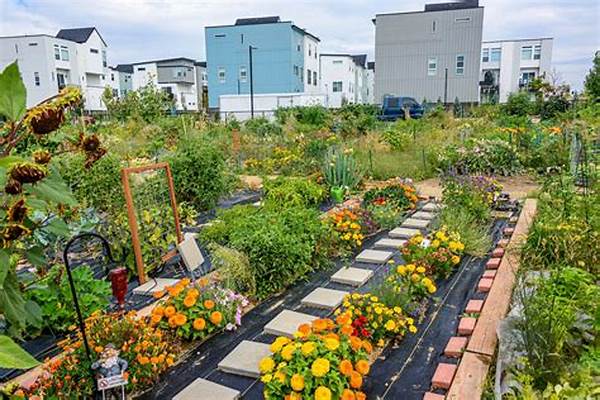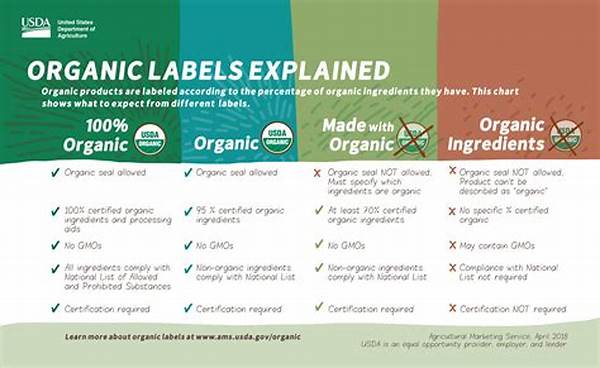In today’s world where sustainable practices are more important than ever, green manure for soil enrichment stands out as a triumph in agricultural innovation. It’s not just about improving soil health; it’s about nurturing our planet for current and future generations. By tapping into the incredible benefits of nature’s cycle, we can enhance productivity, reduce dependency on chemical fertilizers, and cultivate thriving ecosystems. Let’s explore how.
Read Now : Sustainable Agriculture Through Organic Farming
Why Choose Green Manure for Soil Enrichment?
Imagine being able to boost your soil’s fertility while simultaneously protecting the environment. Green manure for soil enrichment is your answer. By planting specific green crops and turning them into the soil, you enhance the organic matter, providing essential nutrients naturally. This sustainable practice reduces the need for chemical fertilizers, thereby lowering the risk of water contamination and promoting healthier produce. Transitioning to green manure not only replenishes the soil but also encourages biodiversity, making your farmland a sanctuary of life. Moreover, it improves soil structure, facilitating better water retention and erosion prevention. When you adopt green manure for soil enrichment, you’re investing in a prosperous, eco-friendly future.
Top Benefits of Green Manure for Soil Enrichment
1. Nutrient Enrichment: Green manure crops, when decomposed, release vital nutrients back into the soil, enriching its quality naturally.
2. Soil Structure Improvement: These crops enhance soil aeration and structure, making root penetration easier and increasing water retention capacity.
3. Weed Suppression: The dense growth of green manure crops outcompetes weeds, reducing the need for chemical herbicides.
4. Erosion Control: Green manure for soil enrichment helps in binding soil particles together, significantly reducing erosion.
5. Biodiversity Boost: These crops attract a variety of beneficial insects and organisms, fostering a balanced ecological environment.
How Green Manure Works in Soil Enrichment
Understanding the mechanics of green manure for soil enrichment is fundamental to appreciating its benefits. When green manure crops, such as clover, vetch, or ryegrass, are sown and later ploughed into the ground, they break down and decompose. This process releases a multitude of nutrients, including nitrogen, phosphorus, and potassium, directly into the soil. Such natural nutrient cycling enhances soil fertility, reducing the need for synthetic fertilizers. Not only does this promote healthier crop growth, but it also supports the microorganisms essential for productive soil, thus creating a more resilient agricultural system.
Furthermore, green manure crops contribute to the physical improvement of soil. Their roots penetrate deeply, breaking up compacted layers, which enhances soil aeration and drainage. As the organic matter decomposes, it increases the soil’s ability to retain moisture, proving particularly beneficial during dry spells. The adoption of green manure for soil enrichment transforms the ground into a more hospitable environment for plant roots and soil-dwelling organisms alike, promoting a synergistic, self-sustaining system.
Selecting the Right Crops for Green Manure
Choosing the appropriate crops for green manure for soil enrichment is crucial to maximizing the potential benefits. Leguminous plants, such as peas and beans, are excellent choices due to their nitrogen-fixing abilities. When these plants are incorporated into the soil, they significantly boost the nitrogen levels, making them perfect for subsequent plantings. Additionally, cereal crops like oats or rye are ideal for their rapid growth and biomass production, which are essential for soil structure improvement.
Read Now : Biodegradable Mosquito Deterrent Solutions
Implementing Green Manure Practices
Implementing green manure for soil enrichment can revolutionize your farming practice. Imagine slashing your fertilizer costs while simultaneously protecting the environment. Start by planning the integration of green manure into your crop rotation. Timing is essential; sow these crops after your main harvest to ensure they have a chance to establish before being ploughed back into the soil. This strategic move guarantees maximum nutrient return.
In addition to crop rotation, consider the specific needs of your soil. Customizing your choice of green manure crops to address specific deficiencies can significantly improve your soil’s health. Whether it’s boosting nitrogen levels or improving structure, targeted green manure application offers tailored solutions. With perseverance and prudent planning, green manure for soil enrichment becomes a transformative practice, enhancing productivity and sustainability.
How Green Manure Enhances Sustainability
Transitioning to green manure for soil enrichment is a step towards achieving a sustainable agricultural model. The reduced reliance on chemical fertilizers lowers the carbon footprint and minimizes pollution risks. By fostering organic farming practices, you contribute to a healthier planet while experiencing increased yields. The biodiversity supported by green manure crops further strengthens your agricultural ecosystem, making it more resilient against pest outbreaks and climatic fluctuations.
The use of green manure is not just an agricultural decision but an environmental imperative. By choosing green manure for soil enrichment, you take a proactive role in combating climate change, encouraging soil conservation, and promoting ecological balance. It’s an investment in the planet’s future — ensuring sustainability for generations to come.
Summary: Reaping the Rewards of Green Manure for Soil Enrichment
In conclusion, green manure for soil enrichment is not merely an agricultural strategy; it’s a commitment to nurturing our Earth. This revolutionary practice provides a viable solution to many farming challenges, from nutrient depletion to environmental degradation. By integrating green manure crops into farming routines, you significantly enhance soil fertility, promote ecological balance, and achieve a superior quality of produce.
The benefits of adopting green manure strategies ripple through the entire ecosystem. By improving soil structure and fertility, you set the stage for healthier crops and sustainable farming. As the global community becomes more eco-conscious, practices like green manure for soil enrichment set the standard for a brighter, more resilient agricultural future — one where the health of the soil directly translates into the health of our communities and planet.



